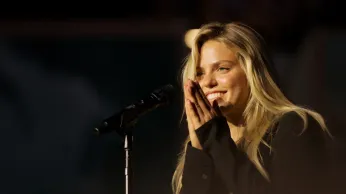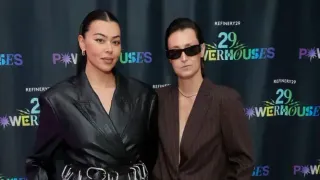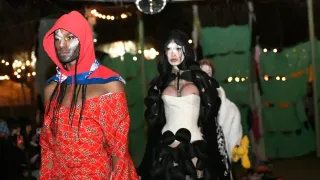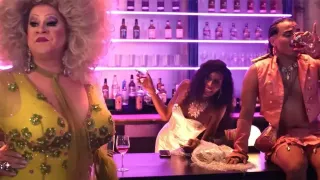
5 hours ago
Reneé Rapp and Jennifer Beals Share the Stage: A Night of Queer Joy and Iconic Allyship
READ TIME: 3 MIN.
On October 19, 2025, at a sold-out show that quickly became the talk of queer media, Reneé Rapp—one of pop music’s most visible and outspoken young queer artists—brought Jennifer Beals, a star synonymous with LGBTQ+ cultural history, onstage for a surprise appearance. The event was covered in detail by Autostraddle, whose reporting captured both the fanfare and the deeper meaning behind this meeting of two generations of queer icons .
Reneé Rapp, known for her roles in Broadway’s “Mean Girls” and HBO Max’s “The Sex Lives of College Girls,” has recently garnered acclaim as a pop musician whose lyrics and public persona are unapologetically queer. Rapp’s debut album and her candid discussions of sexuality, gender, and mental health have made her a role model for young LGBTQ+ listeners, earning her a devoted following and critical praise from outlets like Rolling Stone and Billboard . Her concerts are celebrated for their inclusivity and for creating space where fans—many of whom are queer or questioning—can feel seen and safe.
Jennifer Beals, famed for her lead role as Bette Porter in “The L Word,” remains an enduring figure in LGBTQ+ media representation. Since the show’s original run in the early 2000s, “The L Word” has been credited as a milestone in lesbian and bisexual representation on television, influencing generations of viewers and creators alike . Beals herself has continued to advocate for LGBTQ+ causes, frequently using her platform to speak out for inclusion, visibility, and allyship.
During the concert, Rapp invited Beals to join her on stage—a gesture met with raucous cheers. Autostraddle’s report described the moment as one of “pure joy,” noting the visible excitement from both Rapp and Beals as they hugged and danced together, much to the delight of attendees . Clips of the event quickly went viral on social media, with fans celebrating not just the star power, but the significance of seeing two openly queer—and queer-supportive—women sharing a stage.
The symbolism was not lost on the audience or the broader LGBTQ+ community. For many, Beals represents a pioneering era of queer visibility, while Rapp embodies the new generation’s confidence and authenticity. Their onstage collaboration was widely interpreted as a bridge between past and present, showing how far queer representation has come while honoring those who paved the way.
LGBTQ+ social media spaces and forums were abuzz following the concert, with many users expressing gratitude for the public display of mutual respect and allyship. Commenters on Autostraddle and platforms like X described the moment as "healing," "iconic," and "a reminder of queer joy in challenging times" . For younger fans, Rapp’s embrace of Beals offered a living connection to LGBTQ+ media history; for older viewers, it was a validation of decades spent fighting for visibility and acceptance.
The event also sparked conversations about the ongoing evolution of queer representation in popular culture. While “The L Word” broke ground by centering lesbian and bisexual characters in a prime-time drama, today’s landscape is broader and more diverse, with queer stories and characters appearing across genres and platforms . Artists like Rapp, who foreground their identities in both their art and activism, are seen as carrying forward the work begun by shows like “The L Word,” but with a new openness that reflects changing social attitudes.
Industry analysts and LGBTQ+ advocates noted that moments like this have ripple effects beyond entertainment. As more queer celebrities collaborate, express mutual admiration, and visibly support one another, they model acceptance and solidarity for audiences—especially those in regions or families where being out is still fraught with risk. The cultural significance of seeing one's identity celebrated, rather than hidden or stigmatized, cannot be overstated .
Jennifer Beals’s ongoing relevance is a testament to the lasting impact of “The L Word” and similar pioneering works. The show’s legacy lives on not only through its sequel, “The L Word: Generation Q,” but also through the ways it inspired real-world activism, including the founding of organizations and the launch of media projects by and for LGBTQ+ people . Meanwhile, Rapp’s success demonstrates the power of authenticity and the importance of new voices in keeping queer culture vibrant and relevant.
The onstage meeting of Reneé Rapp and Jennifer Beals was more than a celebrity cameo—it was a moment of affirmation for LGBTQ+ people across generations. By honoring each other publicly, these two artists underscored the importance of community, continuity, and celebration in queer life. As Autostraddle’s coverage made clear, such events do not just entertain; they inspire, heal, and uplift, reminding audiences everywhere that queer joy is both historical and ongoing .






